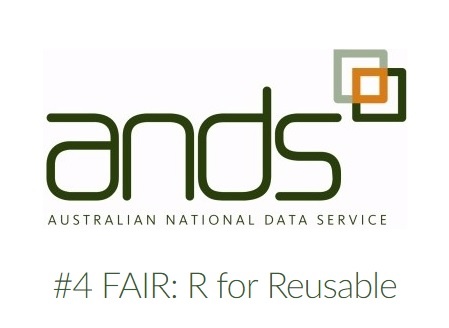FAIR Webinar series : #1 Findable #2 Accessible #3 Interoperable #4 Reusable (recorded ANDS webinars)
10/12/2017

The FAIR data principles (Findable, Interoperable, Accessible, Reusable) were drafted by the FORCE11 group in 2015.
The principles have since received worldwide recognition as a useful framework for thinking about sharing data in a way that will enable maximum use and reuse. The common application of FAIR principles result in great benefits for research, industry, society and our environment.
Find out more about the FAIR data principles which bring together licensing, provenance and domain-relevant standards, resources to support institutional awareness and uptake of reusable FAIR data.
|
|
This ANDS Webinar Series is a great opportunity to explore each of the four FAIR principles in depth - through practical case studies from a range of disciplines, Australian and international perspectives, and resources to support the uptake of FAIR principles. This series is of interest to those who work with creating, managing, connecting and publishing research data at institutions:
|
You can start getting more of these Webinars right now:
#1 Findable
Watch the full recording (YouTube 35:40) Speakers 1. Keith Russell, ANDS, introduced FAIR 2. Nick Thieberger, Director of Paradisec, presented how Paradisec has made their data findable via rich metadata, identifiers through Research Data Australia and disciplinary discovery portals. |
#2 Accessible
Watch the full recording (YouTube) Speakers: 1. Keith Russell, ANDS, provided an overview of the key components of accessibility
2. David Fitzgerald, Data Manager for the Australian Longitudinal Study of Women’s Health (ALSWH) presented on how ALSWH makes a nationally significant longitudinal study with highly sensitive data accessible for others to reuse.
3. Jingbo Wang Data Collections Manager at NCI presented on how they make data accessible through services over the data so they can be interrogated and used by humans and machines.
|
#3 Interoperable
Watch the full recording (YouTube 30.37) Speakers: 1. Keith Russell, ANDS, provided an in-depth overview of the key components of interoperability
2. Simon Cox and Jonathan Yu, CSIRO, presented on how they have made the research data in the OzNome project interoperable, not only for humans, but also for machines
|
#4 Reusable
Watch the full recording (YouTube 26.04) Speakers: 1. Keith Russell, ANDS provided an overview of the principles behind the FAIR concept of how to make data reusable
2. Margie Smith, Geoscience Australia discussed why Provenance information is critical to data reuse and how GA have approached attaching provenance information to data
3. Nerida Quatermass, Creative Commons Australia @QUT, presented on licensing frameworks and choosing a licence to make the data more Re-usable
|
To stay tuned for updates from ANDS, follow ANDS on Twitter @andsdata
Related:
- FAIR Principles and Data Management Planning (Webinar@AIMS recording)
- Are the FAIR Data Principles Fair? (LIBER Webinar recording)
-
Data aggregators: a solution to open data issues (OKI; provides the evidence in favour of this argument by observing how FAIR principles, namely Findability, Accessibility, Interoperability and Reusability, are put into practice by four different data aggregators engineered in Indonesia, Czech Republic, the US and the EU)
- Put FAIR principles into practice and enjoy your data (AIMS blog entry)
- FAIR data treatment and training with Dutch Techcenter For Life Sciences (AIMS blog entry)

.jpg)